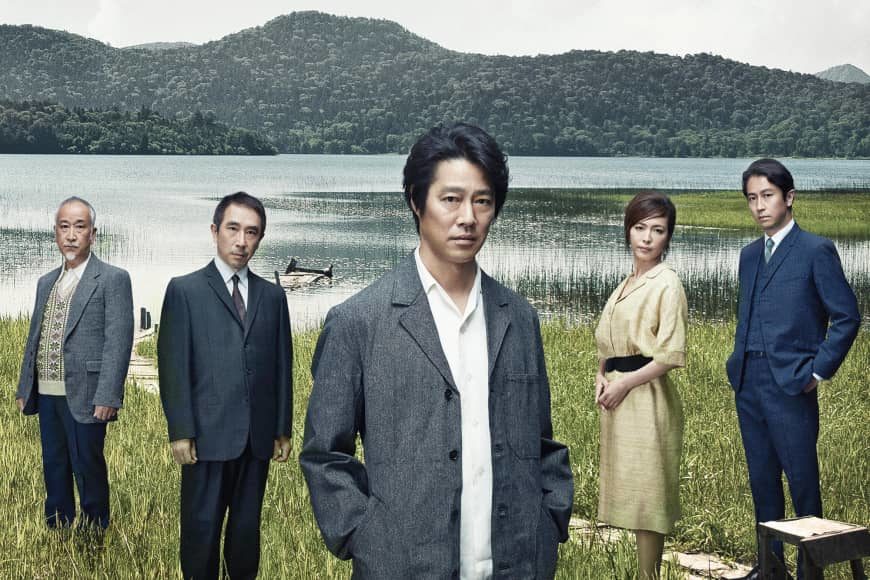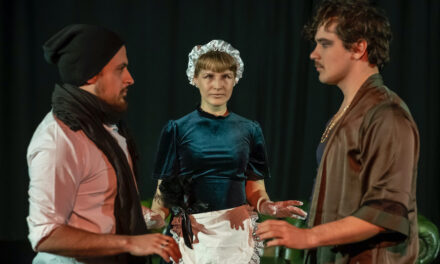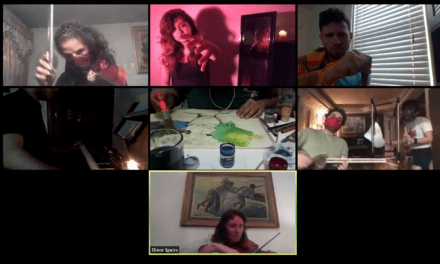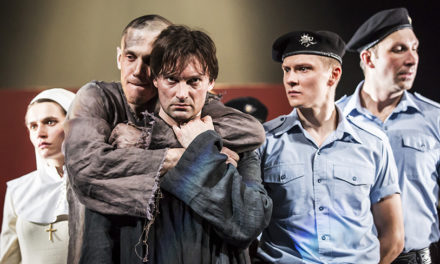In one bound, the rising English director Jonathan Munby found himself in the spotlight of Britain’s theater scene in 2017 when his smash-hit production of King Lear, with Sir Ian McKellen in the title role, transferred straight from the rural Chichester Festival Theatre to the West End.
Now, with the final curtain having just fallen on a long sell-out run there, Munby has arrived in Tokyo to stage his second work for Bunkamura Theatre Cocoon: An Enemy Of The People, written in 1882 by the Norwegian “father of modern drama,” Henrik Ibsen.
So, what drew him to this venerable work set in a poor little coastal town in Norway where its protagonist, Dr. Thomas Stockmann (played by Shinichi Tsutsumi), discovers the water in a hot-spring spa built at great cost to attract tourist cash is dangerously polluted?
Describing himself as a socialist (“of course”), the director declared straight off that “the play really taps directly into what’s going on politically in the world,” citing how Stockmann’s plan to reveal the facts through an article in the local paper is thwarted by his own brother Peter (Yasunori Danta), who, in his role as the mayor, launches a cover-up to prevent the toxic truth from bankrupting the town.
But when news of Stockmann’s claim leaks out and bitterly divides the residents over whether to publicize the danger or not, Munby points to contemporary echoes in how the doctor’s decision to call a town meeting descends into chaos fueled by his own extraordinary invective about “the colossal stupidity of the authorities” and a small-minded majority who “may as well be exterminated.”
After that, as the director notes, things get pretty sticky for the play’s protagonist as he becomes an outcast—although he eventually finds some hope in the younger generation.
“This play looks at the majority and their power to change things even when they are wrong — and that’s exactly what happened with Brexit,” Munby says. “Also, it’s exactly what happened in the United States with Donald Trump. So it’s happening everywhere,” he adds with a shake of his head.
Warning that such attitudes could someday cause global, not just national, crises, he points out, “This play looks at the costs to the environment in relation to the creation of wealth. So it’s very interesting to be asked back to Japan to do it here post Fukushima, because I see the same mistakes being made across the world where we do things to the environment in order to create wealth and it costs the environment.”
Munby, furthermore, notes how this play’s dynamism rests on its ambiguity and people’s changeability—which are particularly exposed in Act Four’s town meeting scene.
“I think what’s really fascinating is the central character, Stockmann, who has a very close relationship with us, the audience, as he stands for the truth and for individualism against the odds. Then he turns around and betrays us and says everyone’s stupid.”
“I’m afraid almost anyone could easily be violent like those townspeople in the meeting if some inner trigger is released. That’s exactly why we see mass hysteria during wartime, or even in street riots. In fact, Hitler loved this play.”
Though the director insists “there are no goodies or baddies here; this is not a black-and-white argument,” he also says that “power seems to be addictive and to overshadow any sense of morality. It also leads people to make extraordinary choices and reveal themselves as hypocrites — corrupt individuals with no sense of morality.”
But Munby’s outlook isn’t entirely bleak. Suggesting the glimmer of a possible solution to these problems, he says, “At the moment, I feel very pessimistic because, as the far right makes a resurgence in Europe and America, I just see history repeating itself.”
“Yet when Stockmann illustrates differences between people using the metaphor of stray mongrels and pure, pedigree pooches, one person in the meeting speaks out, saying, ‘No, we’re not dogs.’”
To this, Stockmann replies, “No, we’re all just animals fighting for our place, fighting each other, fighting for survival. But we have to somehow transcend that and be better.”
Meanwhile, in this production, Munby says he’s sticking closely to Ibsen’s original, though he will “cast his own spell” to make it more familiar to today’s Tokyo audiences. So, just as his King Lear played out so well set against ominous 1930s politics and militarization, he’s decided to shift Ibsen’s drama to the 1960s.
“It’s interesting because when I was researching I found that Norway discovered oil offshore in the 1960s and started to drill for it. Of course, it very quickly made lots of money—but at a huge cost to the environment. Coincidentally, too, in Japan, the first nuclear power station was opened in 1963.”
Munby says this made him think about the play’s relation to the 1960s. He says he came to see it more through that lens, and thus came to understand it better.
“Act Four also bursts into civil unrest and demonstrations, with people turning against Stockmann and attacking him, his family and his home. And I thought how the 1960s was all about demonstrations and insurrections—even in Japan—and we’ve discussed this a lot in our rehearsals.”
Indeed, in the process of creating what he calls “An Enemy Of The People for modern times,” Munby says there have been many lively discussion sessions with and among the Japanese cast, “because actors need to own the characters and the story for themselves.” This sentiment is in line with his conviction that theater doesn’t need a dictator, as it should be a democratic process.
Then, finally, he disclosed another important reason why he decided to do this play in Japan.
“After my production of The Crucible, Arthur Miller’s allegory of McCarthyism, opened here in 2016, we were having a conversation at Bunkamura about me possibly returning here to do something else with Tsutsumi, who had a major role in that production,” Munby says.
“As that play was such a positive experience for both of us, we were quite clear about working together again. So it was just about finding the right role for him and the right play—and what’s great about this role is that it shows a much lighter side of his personality and it’s much more playful and much funnier at times.”
The director explains that Ibsen wondered whether to call the play a comedy or a straight drama, adding that both he and his cast had enjoyed its “wonderful human absurdity.”
“In the end, though, I would like to say to the audiences that the majority isn’t always right. But neither necessarily is the individual,” Munby says.
This article originally appeared in The Japan Times on November 29, 2018, and has been reposted with permission.
This post was written by the author in their personal capacity.The opinions expressed in this article are the author’s own and do not reflect the view of The Theatre Times, their staff or collaborators.
This post was written by Nobuko Tanaka.
The views expressed here belong to the author and do not necessarily reflect our views and opinions.


















